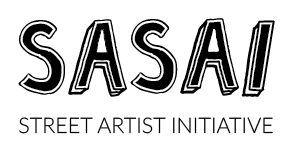OUR MISSION
SASAI is a platform for artists to access information, education and resources, while collectively working toward improving the lives of others through art. SASAI works to arm artists with the tools to know their rights to protect them from arrest, assault or being taken advantage of because they express themselves.
The Street Artist Initiative (SASAI) was formed in South Africa in 2015, and is a non-profit organization dedicated to providing education, resources and services to artists.
OUR STORY
Three years ago the Street Artist Initiative, known as SASAI, was born through the vision of 20 artists performing on Bree Street in Johannesburg's CBD attempting to navigate the cryptic permitting process required to perform in public spaces. Today those very same artists continue to dedicate their performances to instigating change in the perceptions toward street artists from all different backgrounds and artistic expressions.
SASAI brings artists together to share their stories and experiences in order to educate artists on their right to express themselves in public space and the importance of sharing art with the masses.
The organization’s first major initiative, Performance Power, is a pamphlet that publishes the required steps to get permits for performance in public spaces in Johannesburg’s Central Business District. This will be the first time the process appears in print. Performance Power will be released in May 2016.
SASAI also proudly sponsors It’s Not A Train Smash poetry slam events in a several year partnership with African Dreamin’ to produce events that allow people to be moved by art while encouraging artists to be who they are, say what they want to say and share their talent with the world.
““Ever since my first visit to Johannesburg, I have been struck by the extent to which the feel of the city is reflected in its sound…and music in particular (as) key channels of an Afro-cosmopolitan identity. Music has not only been central in the city’s formation. It has contributed to its high levels of social energy, which made it permeable, flexible and defiant, especially in times of struggle and racial conflict.””

